- Author Matthew Elmers [email protected].
- Public 2023-12-16 21:49.
- Last modified 2025-01-24 09:17.
“I passed the field of a lazy man and past the vineyard of a poor-minded man: and behold, all this was overgrown with thorns, its surface was covered with nettles, and its stone fence collapsed. And I looked, and turned my heart, and looked and received a lesson: you will sleep a little, take a little nap, lie down a little with your hands folded, and your poverty will come like a passer-by, and your need will come like an armed man."
(Proverbs 24: 30-34)
It should be noted that the underestimation of the role of increasing the material well-being of certain strata in society that existed in Russia was directly related to the traditional lack of financial resources. There was a constant lack of money in Russia. There was no money for new ships, and they borrowed money from France, for a decent remuneration for the work of the teaching staff, for the selfless labor of zemstvo doctors and teachers, and even for its support - the officer corps - the tsarist government was constantly underpaid! Many historians at the regional level point out directly that this deficiency did not allow satisfying the needs for raising the literacy of workers, as well as their children, and also raising production itself to a higher level.
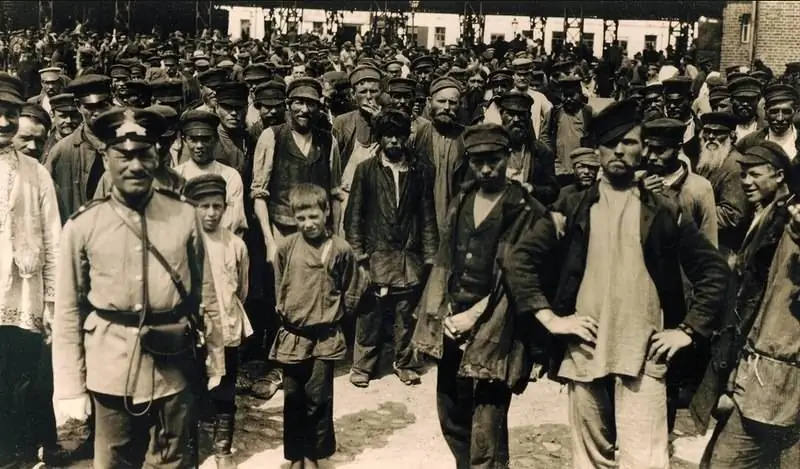
"Any mastery" (a term of the early twentieth century) and police.
In Russia at the end of the nineteenth and early twentieth centuries, it was required to have a rank not lower than the rank of colonel and certainly to receive the nobility in order to be a respected person and at the same time not feel the need for money. But only the rank of general made it possible to feel financially independent as a member of society, since the gap in monetary allowances in the imperial army between the junior officers and generals sometimes differed 9-10 times.
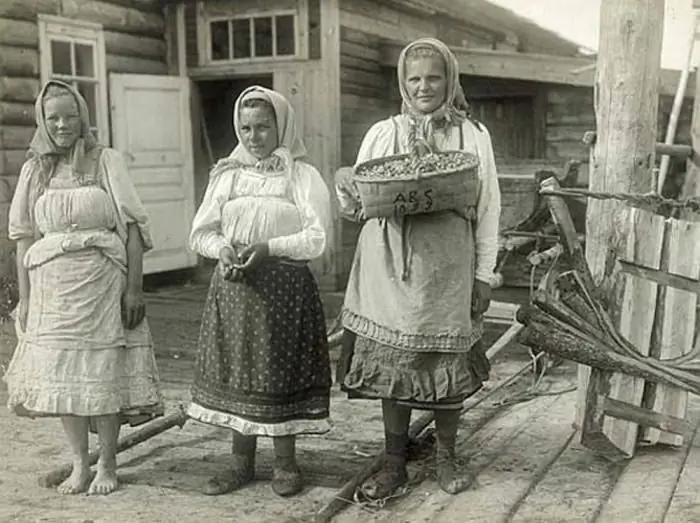
Russian peasant women of the early twentieth century.
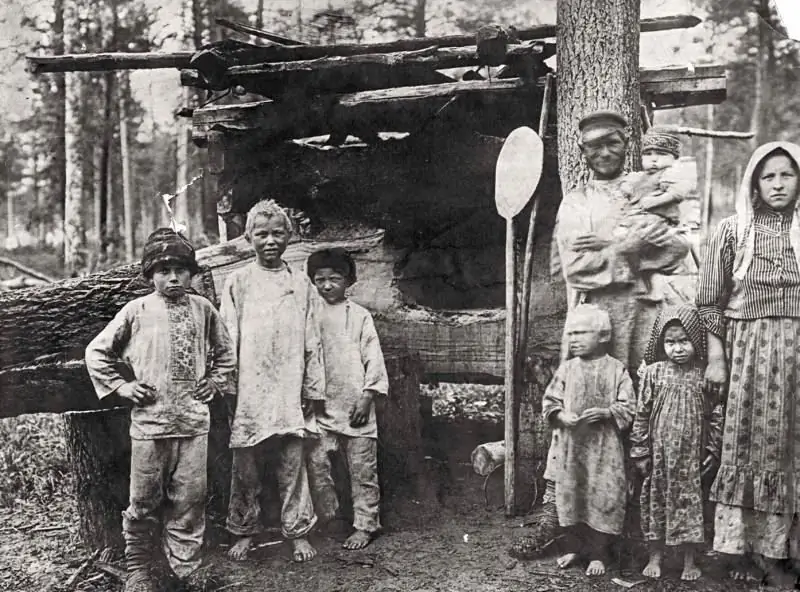
Peasant family.
The situation began to change somewhat just in the nineteenth and early twentieth centuries, which was immediately noted by A. P. Chekhov. Bred by him Professor Serebryakov, a man of common origin, in the play "Uncle Vanya" (1896) marries the daughter of a senator, just to get "upstairs." Moreover, the historian S. Ekshut noted on the pages of the Rodina magazine that Professor Serebryakov, in addition to vulgarity, was an example of a new social mobility: not only individual, but also corporate. But even he, having a high social status of a professor, does not have high incomes and, accordingly, does not have material independence. That is why, having retired, Serebryakov decides to sell the estate that his first deceased wife brought him as a dowry. For the heroines of Chekhov's drama Three Sisters (1900), the Prozorov sisters (although they are all general's daughters!), Moving to Moscow, where their brother Andrei is to become a university professor, is of the same importance. But, alas, this time of a certain material prosperity and social stability was very short-lived for this category of Russian society. In October 1917 it ended once and for all.
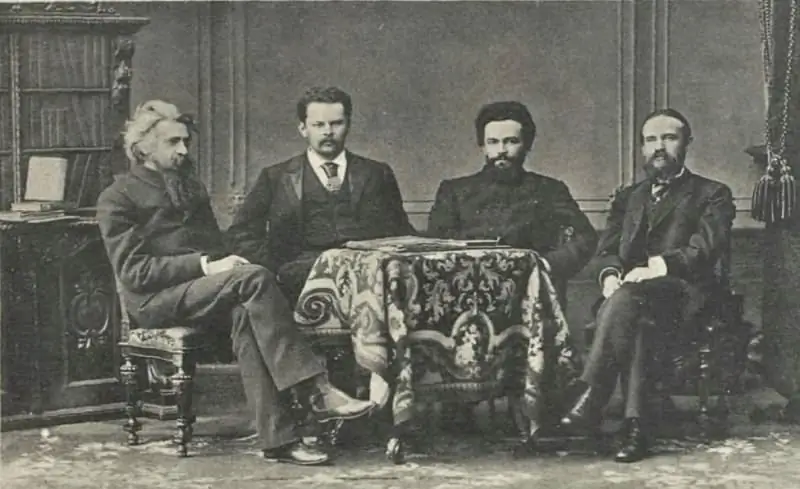
But this is already the intelligentsia: a circle of Moscow philosophers, authors of the journal "Problems of Philosophy and Psychology": Vladimir Sergeevich Soloviev, Sergei Nikolaevich Trubetskoy, Nikolai Yakovlevich Grot, Lev Mikhailovich Lopatin. 1893.
However, it was necessary to encourage not only the Russian professors, but also zemstvo and municipal publications, exempting them from taxes, as well as by issuing substantial sums for publication. Accordingly, publications pursuing a pro-government policy should be supported in every possible way, and journalists should be helped financially. It was necessary to organize the release of free publications for peasants and workers, containing all kinds of crosswords and draws with prizes, in the quality of which gifts were presented on behalf of the royal family, etc.
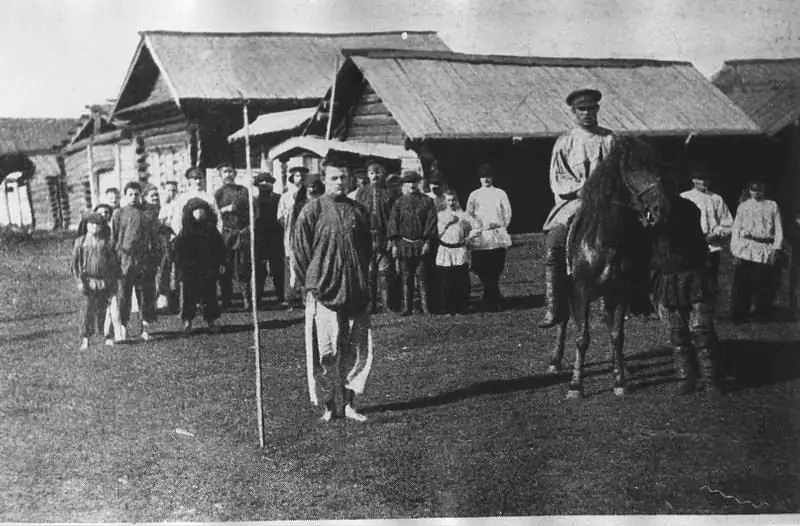
Migrant peasants, 1910. Siberia.
The educational level of its population is also extremely low in Russia. If we compare it with neighboring Japan, which embarked on the path of market relations at about the same time as its northern neighbor, the data will be simply depressing: in 1902, out of every 100 boys in Japan, 88 went to primary school, and in 1907 - 97. In Russia, for every 100 people, on average, there were only 3, 3 people who could read and write. "You will not find even the most seedy village in the country without an elementary school!" - Proudly declared in 1909 the former Japanese Prime Minister Shigenobu Okuma, but in Russia they could not even dream of something like that. At the same time, an average of every third inhabitant of Russia received criminal experience in 1914, the growth in crime was almost 10 times higher than the growth rate of its population.
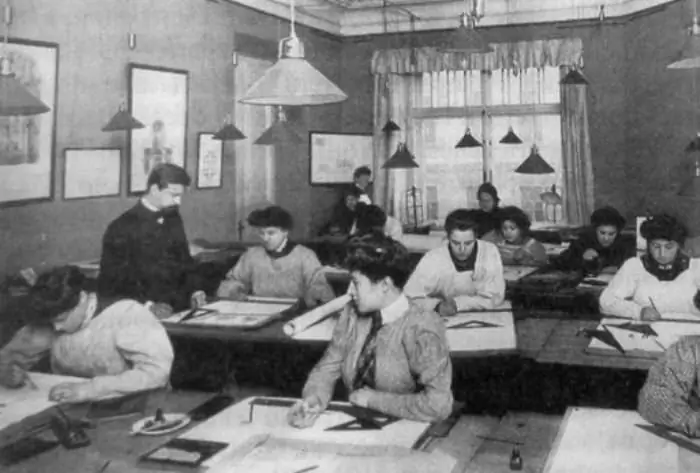
Students of the Higher Women's Architectural Courses E. Bagaeva in St. Petersburg.
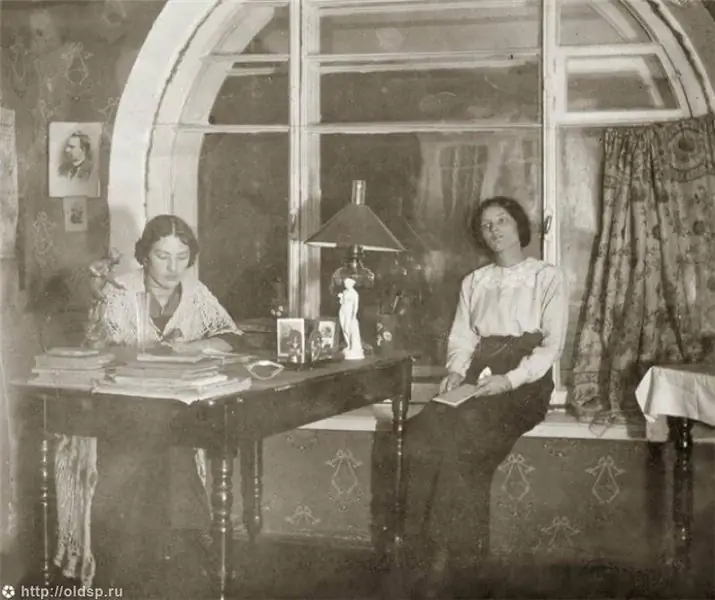
Well, these are the students at home. And there was always such a kerosene lamp under a green shade on the table …
It is interesting that the newspapers noted many points similar to those that appear today even then. An example is children's entertainment reading. Many figures of our culture, as well as VO readers, are told about the alleged dominance of Western films and literature in our country. We will not argue with this statement, but here is what is interesting: in 1910 the same thing was said! For example, in his review of the new catalog of children's literature, M. O. Wolf in No. 6 for 1910, the Penza Provincial Vedomosti newspaper wrote that for some reason books about the life of “Western European peoples, Americans, Asians, the novels of J. Verne, Cooper, Mariet and Mein Reed, and there is almost nothing about Russian the people. There are books about the life of France, but not about Lomonosov. While the books of Charskaya - "when the highlanders are fighting for freedom - it is possible, but when Russia is fighting the Tatar … it is harmful." Based on this, the newspaper concluded that by reading such books, a child, they say, becomes a foreigner at heart, and it is not surprising that our children grow up as enemies of their homeland. Journalists have always loved such biting phrases and statements based on hasty conclusions, right? Although it is true that high school students, including those from Penza, were literally starving in order to buy editions of brochures with stories about the adventures of American detective Nat Pinkerton, despite the fact that teachers unanimously condemned these publications, stating that these brochures are “immoral, dirty and can only answer the rude inquiries of an illiterate reader. " All this is true, but they haven't found a substitute for them! They tried to act only with prohibitive methods. But it is well known that many "Pinkertons" were the creation of A. Kuprin, who did not disdain to compose them in order to earn money. But it never occurred to anyone to hire writers to publish better-quality analogs from issue to issue in the same provincial, zemstvo or municipal newspapers, so the inability to conduct information policy in society is evident even in this example.
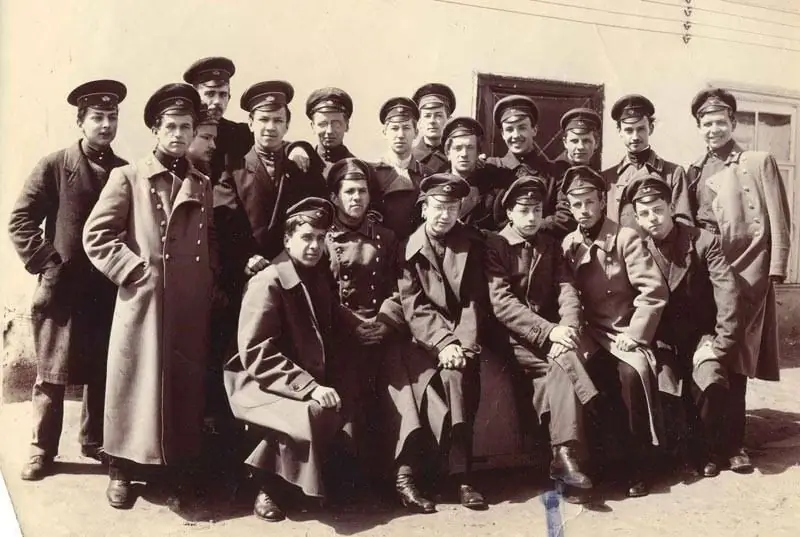
High school students. Not "kids", but just some stallions … They also read "Pinkertonism" …
Surprisingly, it turns out that, although the Russian state tried in every possible way to regulate and control the life and spiritual thoughts of its citizens, both the information and social policy of tsarism in the last years of the empire did not take into account either the scale or the emerging demands of society. As a result, all of its historical development (as before!) Proceeded by way of an extraordinary tension of the available social resources and, what is even more dangerous, the exacerbation of all the contradictions that arose in Russian society to the extreme, which led the Russian autocracy to such a sad end in 1917. …
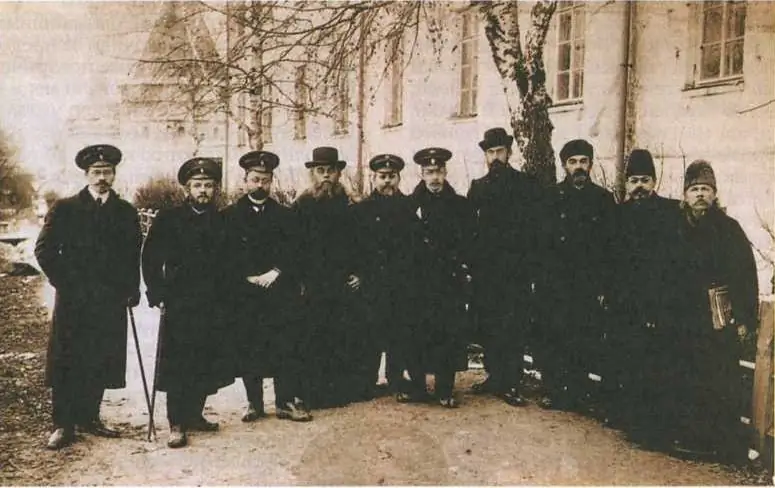
Teachers of the early twentieth century. Everyone is wearing uniforms. Walking sticks in hand. Watches (though they are not visible here) on chains and with hooks.
It is interesting that the above, although in other words, was also noted in the Penza zemstvo press. The newspaper wrote, for example, over 40 years of its activity in the province, the number of literate people has increased. And that was good, wasn't it? But at the same time, “our peasant lives in the same dirty wretched hut with a thatched roof, is constantly malnourished, crop failure and hunger strikes have turned into a chronic economic disease, and that, in general, he is extremely ignorant, and as a result, he has completely lost his sense of legality and respect for power … ". Let us emphasize only the words "lost the sense of legality", which once again shows that the country experienced a systemic crisis of autocracy, both in the economy and in politics, and in the field of education and culture.
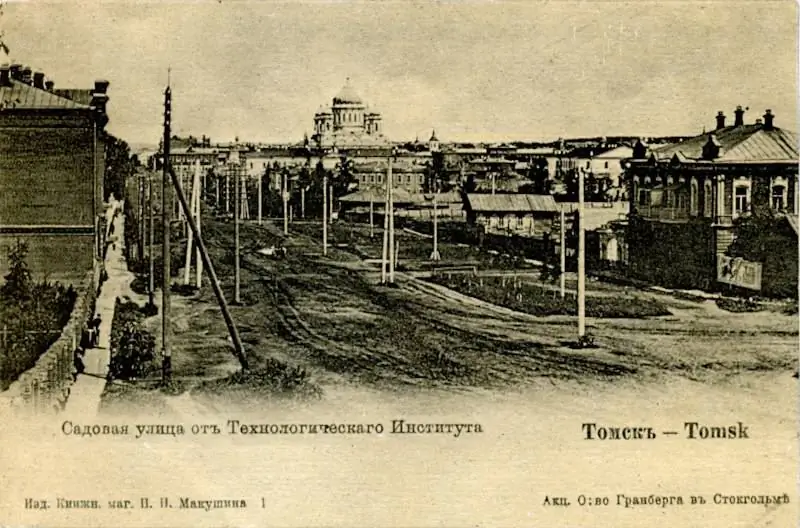
Higher education climbed even into the wilderness …
Well, the conclusion from everything stated here can be unambiguous. And at, so to speak, "the level of two capitals", that is, Petrograd and Moscow, and at the level of such a god-rescued provincial city as Penza, journalists, starting with the appearance of "Notes" by Doctor Diatropov, tried their best to do everything possible so that or otherwise, to denigrate the power that existed in Russia and the Russian statehood. At the same time, they managed to do it even in those cases when they spoke from a pro-government position! For example, they printed a loyal letter from the sailor Belenky, and immediately criticized the generals and admirals, and in general, the entire military department, which allowed the defeat of Russia in the Russian-Japanese war. Meanwhile, it is quite obvious that they should have written that the main blame for the defeat lay with the revolutionaries, who destroyed the rear of the army, sold our military secrets to the Japanese, organized strikes in our factories with the money they received from the Japanese!
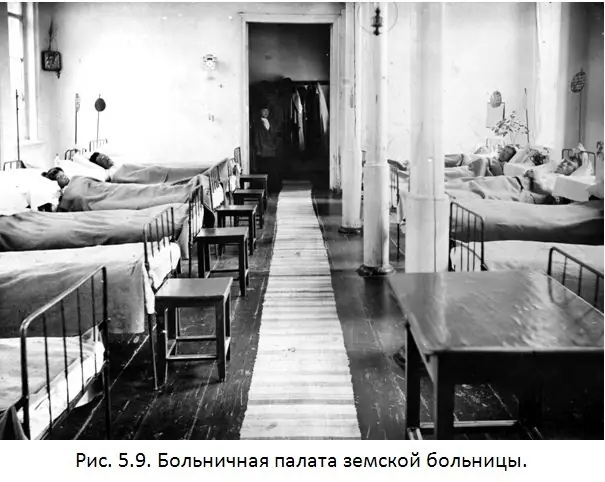
Both schools and zemstvo hospitals were built. Well, such as this one, for example.
But the government is also to blame, because it neglected the information support of its own security and did not even think that "water wears away the stone", which means that sooner or later the amount of negative information will change to a different quality and result in the February and then the October coup … At the same time, he was distinguished by an amazing good nature, strange as it may sound, in relation to his enemies, even some of them, it happened and was hanged, kept in the Peter and Paul Fortress or exiled for three years to Shushenskoye under a “lamp with a green shade ". Meanwhile, the conditions of exile there for the same Ilyich were more than preferential: a decent maintenance at the expense of the treasury, so that he always had meat on the table there. He hunted there, wandered through the taiga with a gun, again, sent his wife there, and in the end he was not exhausted there, but on the contrary, he improved his health and ate! Meanwhile, it was enough to introduce the death penalty for just one membership in the Socialist-Revolutionary Party or the Bolsheviks and … that's all - no one would have dared to join them. And there is no party, no force uniting the masses!
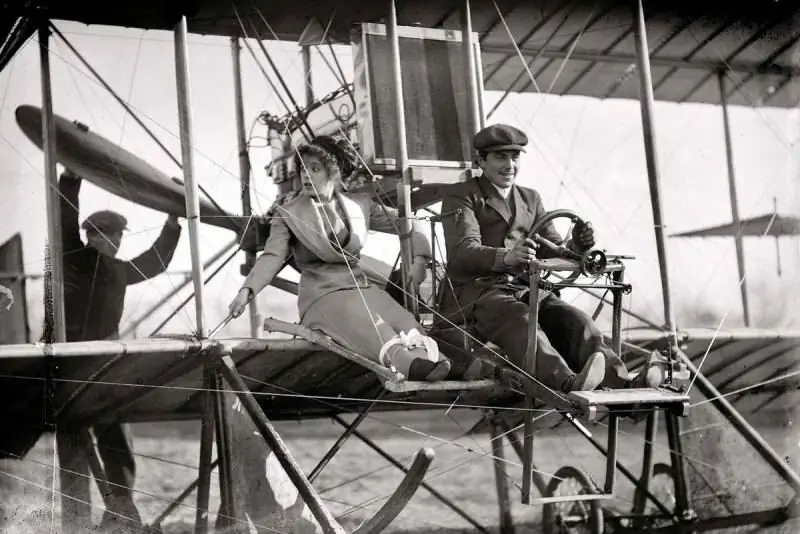
There were also women in Russia who were not afraid to fly on the airplanes of that time. Note that the passenger's legs are tied. "For reasons of morality and ethics!"
And, of course, all of our Russian intelligentsia, and our newspapers were by no means peasants, for some reason, despite their education, they did not understand at all, and maybe they didn’t want to understand that if they would give the common people freedom, then … no maids, no scrubber driers, no cooks (which even the families of gymnasium teachers had then, not to mention the "poor professors" of universities - approx.authors) they will no longer have, and they themselves will have to wash the floors in the house, and wash their clothes, and besides, they will also have to write to the newspaper or give lectures while standing at the pulpit! A simple sense of self-preservation should have prompted them that all this their "superiority of mind" and social status the people would surely remember and punish them for their "dissimilarity". And although they, of course, could not foresee the "professorial steamer" at that time, they should have known better the boorish and envious type of many of our people, their envy of people of "pure labor" - "put on glasses and thinks that everything is possible, but also wearing a hat! " - and keep the gin in the bottle.
Moreover, by that time, history had already clearly and more than once managed to prove that the one who should be enslaved will still be enslaved … but … our journalists either did not know this, or simply did not want to know, and acted like the people who burned down the house, just to warm up by the fire! Of course, they deliberately did not oppose Russia and for the most part did not want to see what happened next, but everything turned out right according to the popular saying: “a bad head, doesn’t give rest to his hands”, and in the case of our domestic journalism, the end of XIX - the beginning of the twentieth century in another way, well, you just can't say!
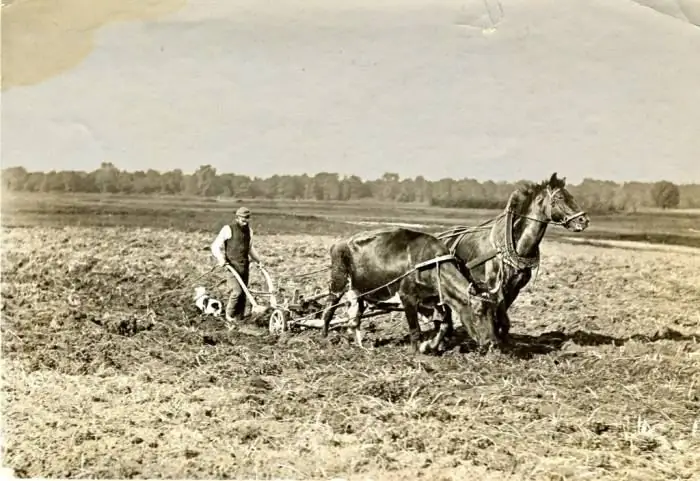
Well, and for the most part they plowed like this …
P. S. A very interesting factual material about the Penza zemstvo and the reflection of its activities in the periodicals of that time is contained in the dissertation of Anna Yurevna Piterova "Penza provincial press on the activities of the zemstvo in the period from 1864 to 1917: On the example of" Penza provincial vedomosti "and" Bulletin of the Penza zemstvo ": dissertation … candidate of historical sciences: 07.00.02. - Penza, - 248 p., Protected in 2005.

The interior of the noble house of the "Silver Age".






